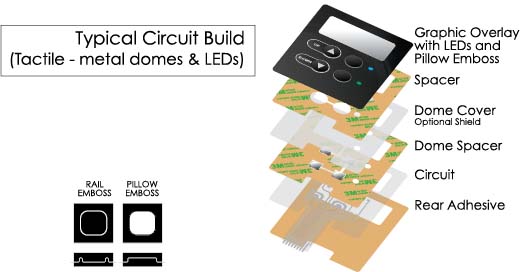Recognizing Membrane Switches: The Trick to Reputable and long lasting Controls

What Are Membrane Switches?
Membrane layer buttons are an innovative solution in the world of individual interface technology, integrating capability and layout perfectly. These devices work as a user interface between users and digital systems, incorporating several elements right into a compact format. Usually constructed from versatile, slim layers of products, membrane layer switches are created to respond to touch, allowing customers to communicate with equipment and electronic devices effectively.
The main elements of a membrane layer button consist of a printed circuit layer, graphic overlay, and a spacer layer that protects against unexpected activation. The graphic overlay can be tailored to mirror brand name identification or user preferences, improving aesthetics while guaranteeing functionality. Membrane switches are commonly made use of in different applications, including medical devices, customer electronic devices, and industrial equipment, owing to their resilience and resistance to ecological elements such as wetness and dust.
Among the crucial advantages of membrane layer buttons is their ability to endure damage, making them optimal for high-traffic settings. In addition, they are light-weight and require minimal room, enabling innovative styles in product growth. In general, membrane changes represent a sensible and reliable option for modern electronic user interfaces, marrying technology with user-centric layout principles.
Exactly How Membrane Changes Job
The operation of membrane changes hinges on a simple yet efficient device that translates user input right into digital signals. When a customer presses the switch, the top layer deforms, permitting a conductive component in the circuit layer to make call with a corresponding conductive pad on the underside of the graphic overlay.
The style of membrane layer buttons can differ, but they frequently include domes or responsive elements to supply responses to the user, boosting the general experience - membrane switch. The products used in membrane layer switches, such as polyester or polycarbonate, add to their durability and resistance to ecological aspects, consisting of wetness and dust. Moreover, the printed circuits are typically encapsulated, which safeguards them from deterioration gradually.
Benefits of Membrane Buttons

In addition, membrane switches are known for their longevity. Constructed from durable products, they are resistant to dust, moisture, and physical wear, which considerably prolongs their life expectancy compared to standard mechanical switches. This durability makes them specifically ideal for high-traffic atmospheres and applications needing longevity.
An additional significant benefit is the ease of cleansing and upkeep. The smooth surface area of membrane changes reduces dirt accumulation and is often unsusceptible spills, making them optimal for settings that need constant sanitization.
In addition, membrane buttons provide a streamlined account, leading to a thinner design that can be integrated right into numerous tools without including bulk. This function not only improves the visual allure however likewise adds to a much more ergonomic product style.
Applications of Membrane Layer Buttons
Flexible and straightforward, membrane layer switches find applications throughout a variety of sectors, including clinical gadgets, consumer electronics, and find here commercial equipment. In the medical field, these buttons are indispensable to tools such as analysis web link devices, patient tracking systems, and infusion pumps, where dependability and ease of cleansing are essential. Their ability to preserve and withstand extreme atmospheres functionality makes them perfect for such applications.

In consumer electronic devices, membrane layer switches are used in products like microwaves, washing makers, and remote controls - membrane switch. Their sleek design permits for intuitive interface, enhancing the total customer experience while giving sturdiness and resistance to tear and put on
Industrial devices likewise profits from membrane layer switches, particularly in control panels for machinery and automation systems. These buttons offer security versus dirt and moisture, making certain regular performance in tough environments. In addition, their customizable attributes enable makers to customize them to certain functional requirements, enhancing performance and functionality.
Picking the Right Membrane Switch
When choosing a membrane layer switch, it is necessary to think about numerous aspects that influence efficiency and viability for particular applications. The key factors to consider consist of ecological conditions, responsive comments, toughness, and style specifications.
First, examine the operating environment; switches subjected to dampness, chemicals, or extreme temperature levels require particular products to make sure longevity and performance. Next, assess the need for tactile comments. Depending upon customer interaction, some applications might profit from a tactile feedback to confirm activation, while others may choose a non-tactile layout for visual factors.
Resilience is another vital element; membrane layer buttons ought to be developed to withstand regular use, effects, and abrasion. Make certain the selected button can endure the anticipated lifecycle, especially Click This Link in high-usage circumstances.

Conclusion
In final thought, membrane layer switches function as vital components in the layout of long lasting and trustworthy control systems throughout numerous markets. Their portable style, combined with robust building and construction and personalized features, improves user communication while ensuring long life in demanding environments. The flexibility of membrane layer switches enables customized solutions that meet details functional needs, strengthening their significance in modern-day technology. As sectors continue to develop, the value of incorporating reliable membrane button solutions can not be overstated.
Membrane changes represent an important element of modern-day user interface style, blending capability with durability in different applications.Membrane switches are an advanced solution in the world of customer interface modern technology, integrating performance and layout perfectly. Generally built from versatile, thin layers of products, membrane layer buttons are developed to react to touch, enabling customers to engage with equipment and digital tools successfully.
The style of membrane buttons can vary, yet they commonly include domes or tactile components to give comments to the individual, enhancing the overall experience.In verdict, membrane layer switches over offer as crucial elements in the design of sturdy and trustworthy control systems throughout various markets.
Comments on “Innovative Membrane Switch Solutions for Customized Control Panels”